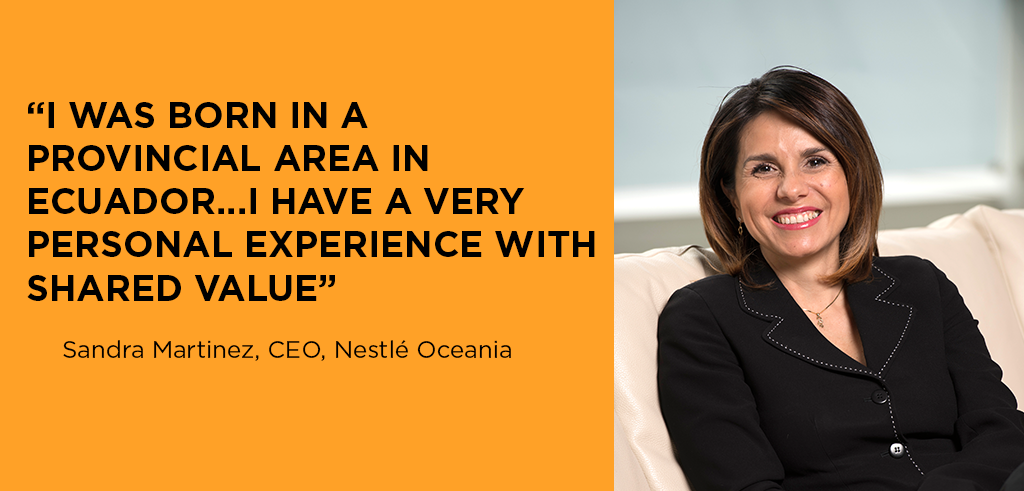Sandra is the Chief Executive Officer of Nestlé Australia Limited, appointed in April 2018. She is a Director of the Nestlé Australia board and Market Head of the Nestlé Oceania Region.
Sandra is a member of the 2018 Shared Value Awards Selection Committee. The awards night, 18 October in Melbourne, celebrates the business leaders and organisations effectively demonstrating shared value.
What does shared value mean to you?
Shared value for me is a mindset. A mindset in terms of the projects, initiatives and activities a company performs, with the conscious decision to ensure that activity will help the community where the business operates, as well as the business itself. It must not only be a positive contribution to the community, but at the same time, we have to know how it supports the business model we want to drive.
What led you individually to the shared value concept? How did you come across it?
I have a very personal experience with the shared value concept, although I didn’t know that was the name.
I was born in a provincial area in Ecuador, a very small country. I had an uncle who had cows and lived as a dairy farmer. I was probably seven years old when I could see a man coming to his farm helping with his farm by giving him advice on things he could do – today we would call it technical assistance. It had an impact on him in that he was getting more from his little farm, and at the same time, it improved the quality of the milk he was producing and delivering – to Nestlé.
I really felt that that was so good – this support was good for him, and it was good for Nestlé.
Now we call it shared value. At the time, I saw it as a company that was looking to improve the area where they have influence.
And today I work for them.
What does shared value success look like at Nestlé and where are you at on the journey?
Nestlé has been on this shared value journey for a long, long time. We didn’t call it shared value but the spirit is the same. This is particularly the case in emerging economies where Nestlé’s know-how and expertise in key areas have helped these countries and these communities. At the same time, Nestlé has profited from better quality of products, from more engaged suppliers, and from more engaged employees and more satisfied customers and consumers.
While we have been on this journey for a long time, we now need to be doing more and faster. Now that I’m working in a developed country, I’m focusing on what our contribution can be – what are the key activities, the key areas where we can make a difference and at the same time, grow our business so we can make a contribution to progress.
What is your role individually within Nestlé to support the company along its shared value journey?
In my current role, it’s making sure that we have this top of mind. It is easy with the everyday pressures of a fast-paced world to put the question of shared value to one side. Sometimes the benefits and contributions of shared value activities are not seen immediately because you need to invest in them first. So my role is to help the organisation see beyond the short term, think holistically about the needs and opportunities of share value mindset.
In my previous role as head of Nestlé’s global Confectionery business unit, there was a very clear area in cocoa where we are committed to making a difference. I feel very proud of what I achieved there as part of the board of directors of the World Cocoa Foundation, initially the only female. When we were looking at the child labour issue I was surprised to see that we were looking at it strictly from a problem-solving point of view, “How do we eliminate child labour from the supply chain?” While that goal is right, there wasn’t enough thought about the root cause of children working.
In Africa, the situation of women is very difficult. But there is no mother on earth who will not do anything for her child. I thought that if we could help these women to get a voice in that society, I was sure that we would have much more opportunity to have fewer children getting into inappropriate work. And so we started working in our child labour monitoring system to ask “How can we empower women?”
I think our role is always to ask “Where can I contribute a little more, with an insight from my own experience?” As a mother, I know that if you give a mother the means to provide for her child, she will do it.
What do you think are some pertinent issues in Australia that could be solved through creating shared value?
Plastics!
When you have a country that’s basically a continent, surrounded by water and you can see firsthand what plastic pollution is doing to the planet, I think that should be our first priority.
We are in a position where we can lead by example. It’s not going to be easy. But if we put our will to it, and take it step by step, we can do it!
